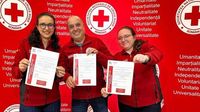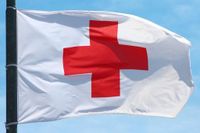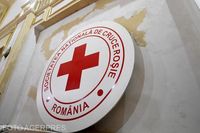The Romanian Red Cross has achieved a significant milestone by obtaining international accreditation for its first aid courses, a recognition that confirms the organization’s commitment to providing training at the highest quality standards. This accreditation, monitored and validated by prestigious international bodies, including the Global First Aid Reference Centre (GFARC) and the International First Aid Attestation (IFAA), ensures that the courses offered are aligned with the latest international guidelines and best practices.
According to Adrian Armășelu, coordinator of the first aid service at the Romanian Red Cross, this process took two and a half years to standardize first aid information across all branches. "This means that all branches deliver the same information, upgraded for 2025, with the same curriculum and presentation. The course you take in Bucharest can be taken in any county," he explained.
The curriculum includes essential maneuvers for emergency situations, featuring practical scenarios and demonstrations that cater to the needs of the participants. At the end of the course, participants receive a globally recognized diploma, which confirms their ability to administer first aid competently and responsibly.
However, the Romanian Red Cross highlights a concerning statistic: eight out of ten Romanians do not know how to administer first aid. This alarming reality puts many at risk during critical situations. Armășelu remarked, "Difficult it is not. It is a beautiful, interactive course. But why don’t we do it? Because there is no tradition and legislation."
To combat this knowledge gap, the Romanian Red Cross continues to implement its national project, the Health Caravan, for the third consecutive year. Launched on April 7, 2025, the caravan has arrived in Vrancea County, specifically in the commune of Vânători and the village of Mirceștii Noi. The caravan is stationed at the Multifunctional Socio-Medical Center "La Ion Marica," established by the Romanian Red Cross in Vrancea, which provides essential logistical facilities for medical activities, including waiting rooms, access to running water, internet, and space for staff meals.
This initiative aims to provide free access to basic medical assistance for the aging population, whether or not they have a family doctor. The caravan's activities are scheduled in phases: from April 7 to April 12 at Mirceștii Noi, from April 12 to April 16 in Vânători village, and from April 28 to May 9 at the Obștei headquarters in Negrilești.
As the Romanian Red Cross advances its mission, the organization remains dedicated to enhancing the quality of first aid training and expanding access to medical assistance in underserved communities. This commitment not only reflects the organization’s high level of preparation and involvement in promoting life-saving education but also underlines the urgency of addressing the widespread lack of first aid knowledge among the Romanian populace.
In summary, the international accreditation of the Romanian Red Cross's first aid courses marks a pivotal moment for the organization, aligning it with global standards and enhancing its role in public health education. With ongoing initiatives like the Health Caravan, the Romanian Red Cross is actively working to bridge the gap in first aid knowledge and provide essential health services to vulnerable communities.






